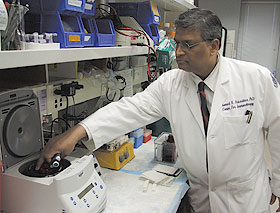  |
| HOME | THIS ISSUE | CALENDAR | GRANTS | BACK ISSUES | < BACK | NEXT > |
Researcher explores potential cancer vaccine using tumor cells
| ||||
| It’s possible that a cancer patient’s tumor holds the active ingredient for a drug that could provide a cure, according to Pramod Srivastava, a professor of immunology at the UConn Health Center. Srivastava has been studying the effectiveness of a vaccine derived from tumor cells.His research suggests that this custom-made drug therapy, called vitespen, triggers the immune system to recognize and attack cancerous cells. The findings are published in the Feb. 20 issue of the Journal of Clinical Oncology. “In this approach to treating cancer, one does not have the vaccine in a bottle off the shelf so that everyone gets the same medicine,” Srivastava says. “We take a patient’s tumor and make the vaccine from it for that patient, on a patient-by-patient basis.” Central to the concept behind the personalized cancer vaccine is the combination of heat shock proteins and peptides. Heat shock proteins are cell components present in all living organisms. Peptides are protein fragments, or the pieces that are left when the body replaces old proteins with new ones. To make the vaccine, heat shock proteins bound to peptides are drawn from tumor tissue. “Extensive animal studies have shown the efficacy of this idea in studies with cancers of mice, rats, and frogs,” says Srivastava. “Most importantly, the scientific principles behind the approach are increasingly clear.” This is the only individualized tumor-derived protein therapeutic vaccine to have been tested in a randomized Phase III trial, he says. Phase III is the last phase in the clinical trial process before a drug has been shown to work and is granted a license. Srivastava is not only the Physician Health Services Chair in Cancer Immunology and director of the Center for Immunotherapy of Cancer and Infectious Diseases at the Health Center, he is also the scientific founder of Antigenics, a publicly-traded company that develops potential treatments for cancers and infectious diseases. “When the science behind the approach became somewhat clear to me, way back in 1992, I realized that this would take a lot of testing, a lot of money, a lot of years, and you can’t do it on grants from the National Institutes of Health,” Srivastava says. “These trials cost tens of millions of dollars, if not hundreds of millions, so it’s not doable except through a commercial entity.”
The Antigenics laboratory in Lexington, Mass., is where vitespen was produced for the trial featured in the Journal of Clinical Oncology article. An abstract of the study is available on the internet. Link: Journal abstract The subjects of Srivastava’s clinical trial were people with Stage IV melanoma, one of the most serious types of skin cancer, for which there is no curative treatment. One group of patients was randomly chosen to receive a vaccine made from their own tumor cells; those in the other group would get whatever standard treatment their physician thought was best. The researchers then kept track of how long each patient lived. The overall results showed no significant difference in survival rate between the two groups. But Srivastava suspects a number of variables skewed the data. Nearly 40 percent of the patients assigned to the group receiving vitespen, for various reasons, didn’t end up getting it, but for the sake of the trial had to be counted with those who did. Additionally, not all of those who did take the vaccine got more than a single dose. When the data comparing patients who got at least four or more vaccines with the patients who received the traditional treatment were analyzed, Srivastava says, it became apparent that there was a link between the number of doses of vitespen received and how long the patient survived. The link appeared statistically significant in the subset of patients who received 10 vaccinations. The results also showed that patients who had tumors in the skin, lymph nodes, or lungs appeared to benefit the most from vitespen. “The next step is to accrue in a new trial of Stage IV melanoma patients, those for whom we can make at least 10 vaccines,” Srivastava says. “Then half of them get regular treatment, and the other half get our vaccine. We’ll see what happens. If the results are consistent with what we saw in this trial, the FDA may approve this as a drug.” Srivastava, who has simultaneously been attending the UConn School of Medicine as a student and in May will have an M.D. to go with his Ph.D., also is investigating the efficacy of vitespen on kidney cancer patients. |
| ADVANCE HOME UCONN HOME |

